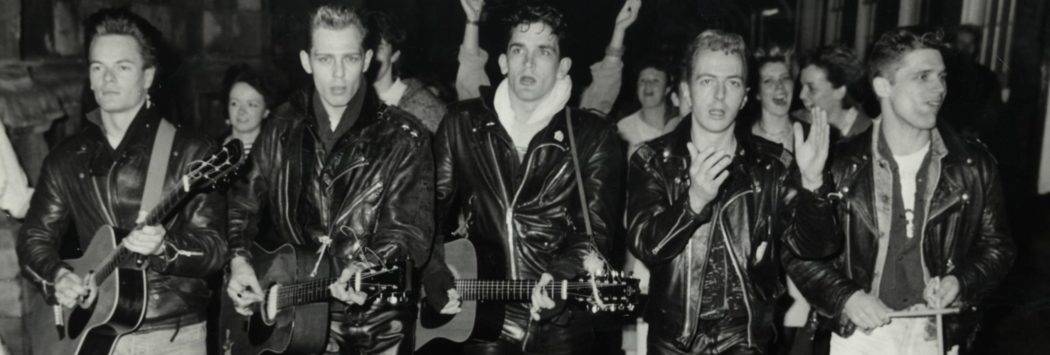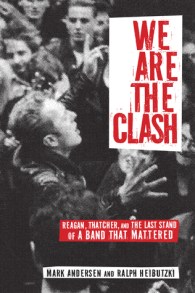
 Crowdfunding can bring us some amazing things. I certainly never anticipated that I’d be reading the autobiography of Richard Jobson, frontman for Scottish punk band The Skids, but here I am with a copy of Into the Valley — and in hardcover, no less, thanks to Wymer Publishing and a successful Pledgemusic campaign.
Crowdfunding can bring us some amazing things. I certainly never anticipated that I’d be reading the autobiography of Richard Jobson, frontman for Scottish punk band The Skids, but here I am with a copy of Into the Valley — and in hardcover, no less, thanks to Wymer Publishing and a successful Pledgemusic campaign.
For those who are familiar with the minutiae of late ‘70s and early ‘80s UK punk rock, The Skids are a fairly familiar band. Their first LP, Scared to Dance, brought the hit from which Jobson’s book draws its name, along with the title track and “The Saints Are Coming,” which found itself being revived by U2 and Green Day post-Katrina (the less said of its inclusion in the trailer for Boondock Saints 2, the better).
Jobson’s songwriting partner, Stuart Adamson, would eventually leave The Skids to form Big Country, who would go onto even greater fame, and The Skids would fold after the release of their fourth album, Joy. The Skids would go on to reform about ten years ago — minus Adamson, who passed in 2001 — and record a new album, Burning Cities, which was released earlier this year.
Jobson tells the story of how he grew up in a Scottish mining town, with a rough childhood, only to become part of this band which — while never quite breaking through in the States — would go on to massive UK success. He tells it in his own words, quite literally, as stated in Into the Valley’s preface:
“I didn’t write this story in the conventional way of sitting down with pen and paper, or even in front of a keyboard, typing it. Instead I spoke it. I just talked as the thoughts came into my head and that should be evident in the reading style.”
It is. Jobson’s autobiography is like reading transcriptions of someone telling a story into a recorder. Some editing, someone asking follow-up questions, or some combination of the two would’ve really helped at points, but given the emotional honesty and candor of what Jobson says, it might’ve resulted in some second-guessing and left Into the Valley as a less forthright read.
The real appeal of Jobson’s book is that he’s looking at these stories from a 40-year remove, but with the memory of the emotions and thoughts he had at the time. It’s rare that an autobiography will acknowledge both the emotions of the time and the logical analysis of what was, in retrospect, hasty or foolish decision-making.
Jobson’s also not hesitant to call former drummer Rusty Egan a motormouth or to admit that when he hears “Arena,” he’s reminded of the headspace he was when he wrote it, and the irony being that he’s still alive, while Stuart Adamson’s the one who committed suicide, and that he “can’t really make sense of that at all.”
Into the Valley is a rough-hewn book, but the story of The Skids, and Jobson’s unique perspective make it a distinctly interesting read for anyone looking to find out more about the early days of punk rock, and how it transmuted into major label New Wave.
 Also tied into punk rock, New Wave influences, and coal mining towns is We Are The Clash: Reagan, Thatcher, and the Last Stand of a Band That Mattered, by Mark Andersen and Ralph Heibutski, from Akashic Books. The story of the “New Clash,” the band which existed following the ouster of original drummer Topper Headon and original guitarist Mick Jones from The Clash.
Also tied into punk rock, New Wave influences, and coal mining towns is We Are The Clash: Reagan, Thatcher, and the Last Stand of a Band That Mattered, by Mark Andersen and Ralph Heibutski, from Akashic Books. The story of the “New Clash,” the band which existed following the ouster of original drummer Topper Headon and original guitarist Mick Jones from The Clash.
As the authors state early on, when a massive, career-spanning collection of all The Clash albums was released as a box set called Sound System in 2013, it excluded the band’s final album, Cut the Crap. This book is an attempt to showcase the fact that The Clash was a legitimate, valuable act after Headon and Jones were replaced by drummer Pete Howard and guitarists Nick Sheppard and Vince White.
Thanks to what must’ve been exhaustive research into contemporary bootleg recordings of live shows and articles chronicling the audience response to the performances, Andersen and Heibutski provide intensely-detailed evidence that this was a band which was firing on all cylinders — especially in a live setting — almost until the very end.
Tied into it all is the political climate both in the UK and the United States, courtesy of the rise of Margaret Thatcher and Ronald Reagan, respectively. Much is made of coal strikes, labor battles, and how the political climate of the time was mirrored by the inner turmoil of the band itself, which may or may not have been able to accurately and effectively respond to what was going on in the world around them.
We Are The Clash is a dense read. There’s a lot of political information to take in, as well as reading about a four-year period of a major band, very rarely ever spoken of, except derisively. The fact that this was a major label, festival headlining act, and that they went on a two-week busking tour of the UK, and this is the first I’ve ever read about it beyond a one-line Wikipedia mention is a testament to how deep these authors go, because they give it thirty magical pages.
Seriously: if nothing else, track down We Are The Clash and read Chapter Eight, “Movers and Shakers Come On.” It will reaffirm any fandom you might’ve once lost for The Clash, and for those who’ve ever doubted them or considered them “corporate punk,” it’ll give you fresh eyes on the band. It’s fucking magical.
These two books reveal far different perspectives on punk rock than so many of the books which have come before, and the sheer novelty alone would be more than enough to make Into the Valley or We Are The Clash compelling reads. The fact that both books are well-written and insightful makes them worth owning.
Into the Valley is available from Wymer Publishing.
We Are The Clash is out July 3 from Akashic Books.




